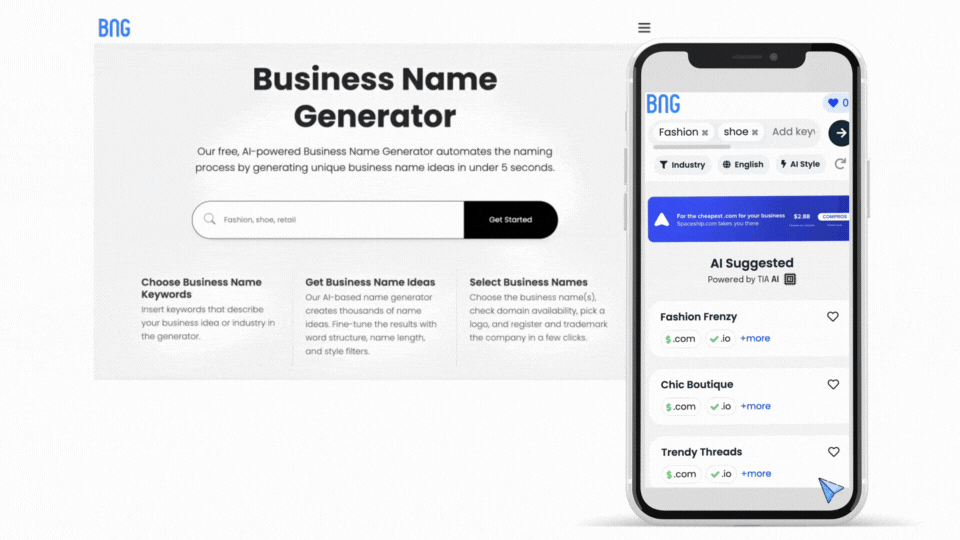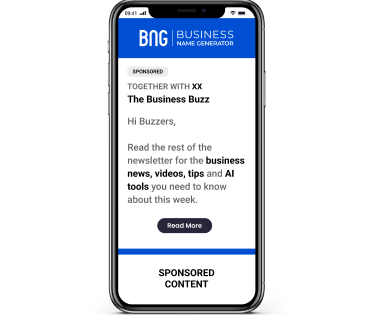How Our Business Name Generator Benefits You

Unique business name ideas
Our AI business name generator generates 1000+ business name ideas in seconds. You can also save name ideas for future reference.
Instant domain name availability checker
Make sure your domain name is available immediately, ensuring that your chosen business name is ready for online presence.
Customization feature
Using our ‘Wizard tool,’ you can adjust parameters such as name length, style (catchy or brandable), keywords, industry, and more.
Free business name generator
Use our business name maker to create free business names, with no hidden fees.
Logo name generator
Once you’ve settled on your business name idea, you can pick a logo to complement your brand identity.
Business name registration
Protect your brand with a trademark and registration, ensuring legal ownership and protection against infringement.
Expert Tips
How to Choose a Business Name
Whether you’re just starting a business, an entrepreneur, or an inspiring small business owner, naming your business is the first step in establishing your brand and creating a unique identity in the market.
The right name can help you stand out, attract customers, and effectively communicate your business values and products. But the process of naming your business isn’t always easy. Follow our six most important steps in creating and choosing a business name.

Research Your Competition
Conduct extensive industry and local competitor research to identify specific keywords, business trends, and connections between a competitor’s story/values and their brand.

Create Personas
Understanding your customers influences the style and tone of your business name. Analyze your target audience, create buyer personas that reflect their preferences and demographics, and refine your search based on this information.

Be Memorable
Catchy business names are short, easily pronounced, and memorable. Visualize your business name in a slogan or advertisement, asking yourself if you’d remember it after just one exposure.

Feedback Fun
Put some business name ideas out there and let your potential customers decide. Watch out for their reactions; this helps validate which name ideas best fit your business.

Futureproof It
Your business name may be used for years to come. Will “James’s Jazz” still be good in 10 years? Fast-forward to the future and assess if it is too current to remain relevant.

Digital Domain
To establish your digital presence, you must register a domain name, username and social media channels that are available to register.
Video Guides
Videos to Get Your Business Started
Do you prefer to learn how to set up a business name by watching videos? We have you covered with our Business Name Generator YouTube channel, packed with helpful videos on starting a business, branding, growth, and more.
Get business name ideas for free
Unique Business Name Ideas
Knowing how to name your brand can take time and effort. To help you get started, we’ve created a list of 20 creative business names using our brand name generator.
- Lumitonique
- EcoQuanta
- Panache
- Fit n Fab
- SolPurify
- News Now
- Kidz Paradise
- Yoga Zen
- AutoCare
- Organic Oasis
- AquaPixel
- EduMart
- PureFeast
- Luxe Looks
- Agro Store
- Stylista
- VisiKore
- Stylista
- AlphaBright
- TechHarvest
Backed by Industry Leaders




Why Is a Business Name Important?
Your business name is the first (and often the only) point of communication with your potential customers.
Your name needs to be slick, catchy, and straight to the point. It should make it clear what your business is all about (i.e., what products or services it offers).
Another aspect of the name is brandability. If the name is not memorable enough, people will forget to return to you for future purchases, and they won’t recommend your products to friends.
The bottom line is, your name has to be chosen thoughtfully. Using a random company name generator might hurt you in the long run if the chosen business name is not relevant to your industry. With our company name generator, you’ll get specific, AI-generated name ideas tailored to your niche and business model.
How Can I Find Unique Cute Business Names?
To find a unique cute business name, get creative. Consider what makes your business cute and unique, and come up with charming ideas that capture that particular angle. Play with cute words such as ‘adorable’, ‘sweeties’, and ‘cuddly’, and create delightful word combinations. The following are some tips to discover unique cute business names:
- Embrace playfulness,
- Think outside the box,
- Appeal to emotions.
How to Use BNG to Find the Best Business Name
A good business idea can only go so far, so finding the right business name is vital in building a successful brand.
It helps with recognition, creates a strong first impression, and differentiates your business from competitors.
Ask these questions when brainstorming company name ideas:
- What are your core values?
- What is your mission statement?
- What does your business offer?
Those answers should guide you as you come up with a keyword list and new business name that reflects the core concept of your new business.
Mistakes to Avoid When Naming a Business
Picking the wrong business name can kill your business before starting it. Some of the main mistakes business owners make with the name are:
- Selecting a difficult business name that’s hard to spell or pronounce,
- Being too generic and not getting people interested,
- Limiting future scalability with a name that’s product- or location-specific,
- Choosing a misleading business name,
- Choosing a name that’s too long,
- Being similar to competitors,
- Not asking for feedback before settling on a name,
- Not checking for double meanings.
BNG Best Practices
Follow the tips and tricks below to generate high-quality company names.
| Steps for Quality Names | Explanation |
|---|---|
| Use more than one keyword | Diversify your business name suggestions with multiple keywords — up to six. The more relevant the keyword, the better business name ideas you get. |
| Go for relevancy | Stick to names that represent your business. The generated name should be relevant to your company and brand. |
| Try it more than once | Use different keywords and combinations to enhance your business name search. The more you use the company name generator, the better your chances of finding the perfect business name. |
| Zero-in on target audiences | What terms do your potential customers use? Can you include them in your company name? |
| Can you see it as a logo? | Use your names to come up with creative logo ideas and visualize them on branded products. Can you put your logo on a letterhead? Would your logo work on a sign? |
Start Generating
Choose Your Industry and Generate Company Names
More Name Ideas for Inspiration
Company Name Ideas
The key to a powerful company name is to capture your brand identity and convey positive emotions. Here are some examples of company name ideas from our AI-based business name generator.
| 1. StarHive 2. Roadio 3. Anywhere Road 4. River Leaf 5. Eco Sanctuary 6. Edenica 7. Utopia Group 8. Diamonday 9. Coco Glamour 10. Blinkworks | 11. Wayscape 12. Glossio 13. Passionify 14. LuxHut 15. Ignition Point 16. Madzilla 17. Urban Oasis 18. Sage & Honey 19. Hideaway Garden 20. Curebea |
Cool Business Names
Cool business names are catchy, quirky, and bold. Whether you’re searching for creative clothing brand names or innovative school name ideas, we’ve got the top 20 cool business names to explore.
| 1. Brightmind 2. Innovia 3. Edusmart 4. Innovatech 5. Edunex 6. Glamora 7. Vougu 8. Chicora 9. Clozify 10. Wardwear | 11. Mindsmart 12. Eduwise 13. Enchantiq 14. Trendluxe 15. Poshify 16. Modeez 17. Urbchic 18. Luxify 19. Chiclet 20. Sleekchic |
Catchy Business Name Ideas
Catchy business names are effective at capturing attention and leaving a lasting impression. Below are 20 inspiring catchy business name ideas to spark your imagination.
| 1. Dash House 2. Bliss Grocery 3. SparkBite 4. Pixel Pulse 5. Zenith Works 6. Nova Nest 7. SwiftVibe 8. BoldRoot 9. AuraEdge 10. ThriveHub | 11. Echo Craft 12. Bright Bloom 13. Nexus Nook 14. Swift Sprout 15. AuraAxis 16. ZenZest 17. Bold Beam 18. Glow Grove 19. LunaLuxe 20. ZenithX |
Funny Company Name Ideas
Funny business names can add humor and playfulness to your brand identity. Below are 20 funny company name ideas selected from the list created by our business name generator.
| 1. Punny Paws 2. Chuckle Craft 3. Quirk Works 4. Giggle Grove 5. Snicker Spark 6. Jolly Jolt 7. WitWagon 8. Guffaw Goods 9. Chuckle Charm 10. LaughLine | 11. JestJive 12. Witty Whirl 13. GrinGizmo 14. Hilarious Haven 15. TeeheeTech 16. Snicker Style 17. Chuckle Chic 18. JestJam 19. HumorHut 20. SnickerSphere |
Simple Business Name Ideas
Simple business names are concise and memorable names tailored to represent your brand with clarity and elegance. The following are 20 simple business name ideas created using our company name generator.
| 1. SwiftWorks 2. Mediaegy 3. Newsdeck 24/7 4. Shoporium 5. BrightBox 6. PeakPulse 7. True Trend 8. PrimePick 9. FreshForm 10. Bold Blend | 11. Quick Click 12. ApexArt 13. Go Car 14. Smooth Sail 15. True Touch 16. Simple Serve 17. Bright Byte 18. Core Craft 19. Heroic Sports 20. ZenZone |
Random Business Name Ideas
Whether you want to grab attention with a witty phrase or add some creativity to your business name, here are some eye-catching random business names to get you started.
| 1. Zesty 2. Hoot & Hollar 3. Sassy Spoon 4. Sizzle works 5. Frosted 6. Glamorize 7. Brewdles 8. Sizzlyn 9. Toastify 10. Pawsome | 11. Zestopia 12. Munchology 13. Craveology 14. Cupcakery 15. Stitchcraft 16. Brewdini 17. GiggleWinks 18. SnipSnaps 19. SwirlifyGlamify |
Toolbox









